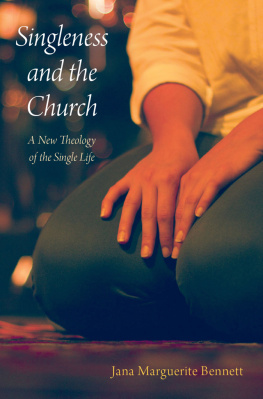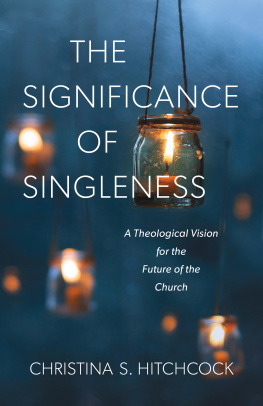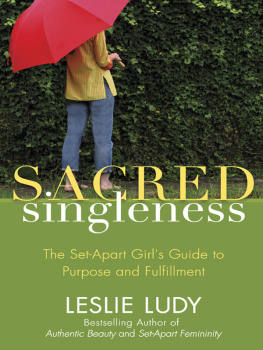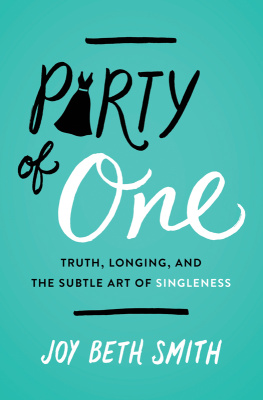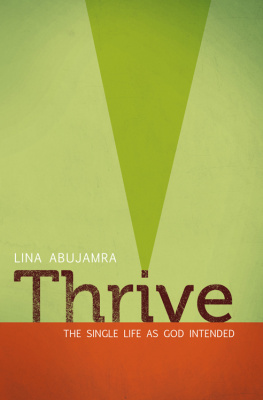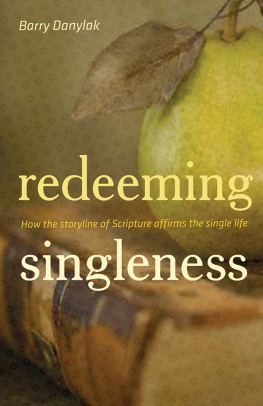Singleness and the Church

Oxford University Press is a department of the University of Oxford. It furthers the Universitys objective of excellence in research, scholarship, and education by publishing worldwide. Oxford is a registered trade mark of Oxford University Press in the UK and certain other countries.
Published in the United States of America by Oxford University Press
198 Madison Avenue, New York, NY 10016, United States of America.
Oxford University Press 2017
All rights reserved. No part of this publication may be reproduced, stored in a retrieval system, or transmitted, in any form or by any means, without the prior permission in writing of Oxford University Press, or as expressly permitted by law, by license, or under terms agreed with the appropriate reproduction rights organization. Inquiries concerning reproduction outside the scope of the above should be sent to the Rights Department, Oxford University Press, at the address above.
You must not circulate this work in any other form and you must impose this same condition on any acquirer.
CIP data is on file at the Library of Congress
ISBN 9780190462628
eISBN 9780190462642
The Catholic Edition of the Revised Standard Version of the Bible, copyright 1965, 1966 by the Division of Christian Education of the national Council of the Churches of Christ in the United States of America.
Used by Permission. All rights reserved.
This book is for my sister, Elissa Brine, a most wonderful single mom.
Contents
FIRST AND FOREMOST, I want to acknowledge the lives and witnesses of the numerous single Christians I have metsome in passing, some who have become lifelong friends. They are too numerous to name without inadvertently omitting someone, but not a day goes without my encountering and remembering particular people who have shown Christ to me by their lives. That there are so many reminds me how full life is, and how bereft the church would be without the lives of single adults. I hesitated to write this book nowas a married woman and mother of three children. But so many people convinced me that something ought to be said and that maybe married people ought not be silent about single witness.
I also owe many thanks to the following people who had read parts of the manuscript, talked with me through the writing of this book, and otherwise provided helpful critiques and ideas: Margaret Adam, Elise Erickson Barrett, David Cloutier, Holly Taylor Coolman, Dana Dillon, Amy Doorley, Neomi DeAnda, Dennis Doyle, Marva Gray, Stanley Hauerwas, Meghan Henning, Kelly Johnson, Bill Johnston, Beth Felker Jones, Brad Kallenberg, Jason King, D. Stephen Long, Emily McGowin, Vince Miller, Benjamin Peters, Bill Portier, Julie Hanlon Rubio, Mark Ryan, Myles Werntz, Celia Wolfe, and Sandra Yocum.
Thank you, as well, to Cynthia Read, Theo Calderara, Gina Chung, and all the other wonderful editors at Oxford University Press. Thanks for seeing this project as something important enough to publish.
I am especially grateful to my graduate assistants over the years who helped find books, make copies, critique parts of the manuscript, and copy edit the bibliography: Christine Dalessio, Anthony Rosselli, and Tyler Campbell. The interlibrary loan staff at the University of Dayton were amazing in getting me references I needed.
This book would not have been possible without the support of my chairperson, Dan Thompson, Dean Jason Pierce, and Provost Paul Benson at the University of Dayton. I am also grateful for Ramon Luzarraga with Benedictine University-Mesa, for hosting a series of lectures on parts of this book in Mesa, Arizona. Anne DeRose, with St. Stephens Parish in Sun Lakes, Arizona, and Steve and Becky Greene with the radio show, The Catholic Conversation, provided additional hospitality and airwaves for discussing this book. My mother, Ann Bennett, provided nannying for my baby so I could get to these gigs! This book goes as far back as ideas shared at the 2006 New Wine New Wineskins conference of Catholic moral theologians, and a 2009 presentation to a students group at the University of St. Louis. Thanks to them for being guinea pigs for a very early draft of some of these ideas.
Finally, of course, Joel, Lucia, Gabriella, and Theodora Schickel: I am so very grateful for you.
Jana Marguerite Bennett
Feast of the Archangels,
September 29, 2016
My hope with this book, and with my simple but broad definition of singleness, is to tell expansive stories about singleness that show how singlenesses contribute to the life of the whole church. Singleness in the context of Christianity is rich in variety and complexity. Thus I include a wide range of states of life that count as unmarried, but each have their own characteristics. I name this range of singlenesses as impermanent ways of living singly. I will also use the phrases state of singleness and single state of life to refer to different ways of being im-permanently single. When I mean to refer to a state of life that is permanent, I will name marriage or vowed religious life specifically.
There is one way of being single in Christian life that is noticeably not a direct focus in this book. I am not particularly addressing the vowed religious life of a monk or nun, or the celibate life of a priest taking holy orders, especially as practiced in the Roman Catholic Church. Vowed life is distinct from other singlenesses. For example, vowed life involves making a public witness in front of a community; it also involves a commitment to permanence. Vowed ways of being single certainly deserve more focus than they often get from Christians as a whole (and would be worth a book-length discussion as well). Yet vowed religious life does receive specific support from church officials and Catholic institutions in ways that impermanent states do not.
Christians often overlook or ignore impermanent singlenesses. Pope Francis recent Apostolic Exhortation on family (Amoris Laetitia) reminded Catholics that they have often forgotten single, non-vowed people in their midst and need to be far more supportive. He calls on Catholics to
provide love and support to teenage mothers, children without parents, single mothers left to raise children, persons with disabilities needing particular affection and closeness, young people struggling with addiction, the unmarried, separated or widowed who are alone, and the elderly and infirm who lack the support of their children.
This book is directed toward remembering some of the people Pope Francis identifies.
The churchs own way of speaking about singleness is a reason why Christians forget single people in their midst. For example, impermanent states of singleness are simply collapsed into a discussion of baptism. The Roman Catholic document Lumen Gentium suggests that in baptism, all people are called to a life of discipleship, though each person has a distinctive role. Marriage and vowed religious life offer further proclamation to the Body of Christ because of what those states of life entail: the importance of stability and lifelong fidelity, children in marriage, and deep, lifelong non-biological relationships in vowed religious life. By contrast, the impermanent states of singleness have often not seemed to have a particular character or wisdom to impart. Rather, they simply take on the general vocations Christians have in baptism.

